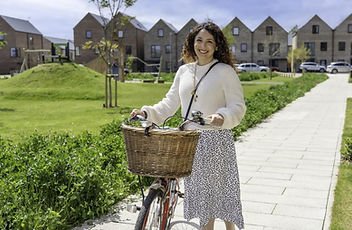2. Work, Housing and Transport, without Private Cars


Brompton Bicycle are planning to build a car-free factory in Ashford, which will be free from private cars. If this is combined with the development of car-free housing for employees, a reduction in car ownership could be achieved and overall costs reduced.
One problem is that the active travel infrastructure required has no way to generate revenue. Transport Groups can bundle the capital costs of infrastructure with the pay-per-use rates of other transport services, and the rent or service charge for car free housing. It can also validate the reduced emissions from owning fewer cars and issue Voluntary Carbon Credits (VCC).
Building car-free work and housing 'prompts' people, who have a compatible need for shared transport, to form Transport Groups. This shifts financial responsibility, for new transport services, from providers to users. A household can reduce its costs from day one, because there is no transition period during which new services and private cars both exist at the same time. In effect, private cars are traded-in for alternatives that meet the same needs.
.png)
Compatible Supply and Demand
In this simplified use case, two private cars are replaced by:
-
1 Shared Access EV (SAEV)
-
1 folding e-bike
-
Access to a cycle path
Together, these cover the same journeys, but only if the car owners have compatible needs for the new services. This means they will need to use the SAEV at different times. When one of the car commuters shown above converts to cycling, their demand for a car changes. By cycling to work and using the SAEV for other journeys they will no longer need to own the car. The other compatible user continues to drive to work, but does not use a car at other times. Compatible supply and demand must be established before any changes are made in the real world, otherwise costs are increased. Participants form a Transport Group which is similar to conventional crowdfunding, but instead of raising a one-off amount of capital, the end point is agreeing to cover the costs of the new shared services. This agreement is made through a smart contract, held on a decentralised network, which will manage the pay-per-use rate of new services when they are provided. This makes it possible to combine the capital and the operational costs of a combination of new services and also balance these across more than one Transport Group.
To include the cycle path in this solution its costs can be linked to the development of car-free housing. The repayment of investment in cycling infrastructure is tied into rent and service charges for housing. Residents build equity in shared transport infrastructure through their rent or service charges. Equity can be sold when they move, turning everyday payments into long-term ownership and value. Issuing Voluntary Carbon Credits (VCC) creates a new revenue stream for providing bikes. The VCC issued could be bought by car drivers through CAZ charges or workplace parking levies.
.png)
Brompton Bicycle’s proposed car-free factory in Ashford is an opportunity to develop Transport Groups that link work, housing and transport. The map below shows planned housing developments within cycling distance of the Brompton factory, all of which require new cycling infrastructure, bikes and access to carshare.
.png)